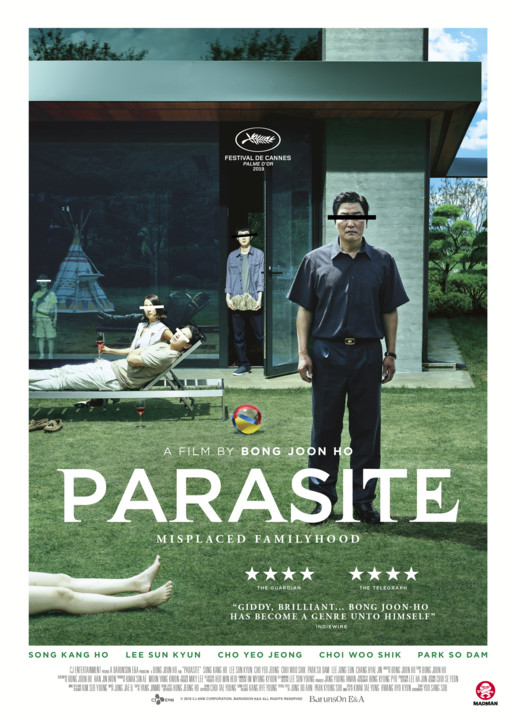
The super rich are better than everyone else. It goes without saying. Writer director Bong Joon-ho (Okja) has different ideas, however: perhaps blind worship of the upper echelons at the expense of our fellow man is not the way that society should work. It's just an idea he's throwing out there. In Parasite, Bong looks like he might be turning out a Trading Places kind of caper, but there are darker forces at play. Bong has put out a very politely worded letter asking that critics not reveal too much of its inner workings. He was nice enough about it, and so batrock.net will do its best to honour his request.
The Kim family lives in a half-basement in the streets of a Korean city, where drunks often urinate by the window. When son Ki-woo (Choi Woo-shik) manages to get a job as English tutor to rich girl Park Da-hye (Jung Ji-so), he sees an opportunity to bring his sister Ki-jung (Park So-dam) into the fold as an art tutor. As the Kim family works to improve their fortunes, they come to understand more about how the fantastically rich live.
Bong's sympathies are transparently clear: the concerns of the Kim family are real, and they translate across international borders. Many of the solutions that they harness are played for laughs, but even on a surface level they should not have to live as they do. The family has an easy chemistry and a refreshing solidarity that does not allow any unnecessary conflict to disrupt the unit. Even when they are performing unambiguously unethical acts, it is practically impossible not to take their side.
The Park family are immediately made out to be slightly off, almost as a get out of jail free card in case someone decides to take umbrage on behalf of the wealthy. We become almost as intimately familiar with their desires as we do the Kims', but they seem shallow and meaningless by comparison. They don't have to seem human, because they may as well not be; humanity and reality are separate beasts, and once you reach a certain level, you become divorced from the society you're hailed as a paragon of.
In some of his films, Bong has had trouble with the balance of tone, with satire drowned out by the cartoonish, and drama giving way to overwhelming unpleasantness. Parasite is a finely honed work with a razor sharp point, that pivots from high comedy to stormy drama in a single fluid motion. The moment that the balance shifts is handled so well that you can feel yourself slide into the next phase of the film, and whatever comes next is entirely beyond what might have been expected.
It is in this shift that we see what Parasite is truly made of: a deep empathy for the Kim family and their situation. The movie begins to make multiple narrative turns that are near impossible to guess, completely divorced from anything that might have been expected; light terror combines with farce for a potent cocktail that makes a perverted sort of sense. Parasite becomes somewhat outlandish, but entirely within the realm of possibility. It's not frightening, but it certainly has the capacity to disturb.
Parasite is a comedy blacker than the dark nights of the soul, but Bong brings a strong vein of humanity to these grifters that he mines expertly. There's a warm glow to a film as well made and argued as Parasite, and Bong asks you first to bask in it, then take it with you and meditate on it. Parasite is deep, provocative, and unsettling. If aspiration is the driving force of a nation, what becomes of those who aspire merely to survive? Bong has ideas, and Parasite wraps them in a tender core despite its prickly exterior.
Parasite opened in Australian cinemas on June 7, 2019.
Directed by: Bong Joon-ho.
Starring: Song Kang-ho, Lee Sun-kyun, Cho Yep-jeong, Choi Woo-shik and Park So-dam.
